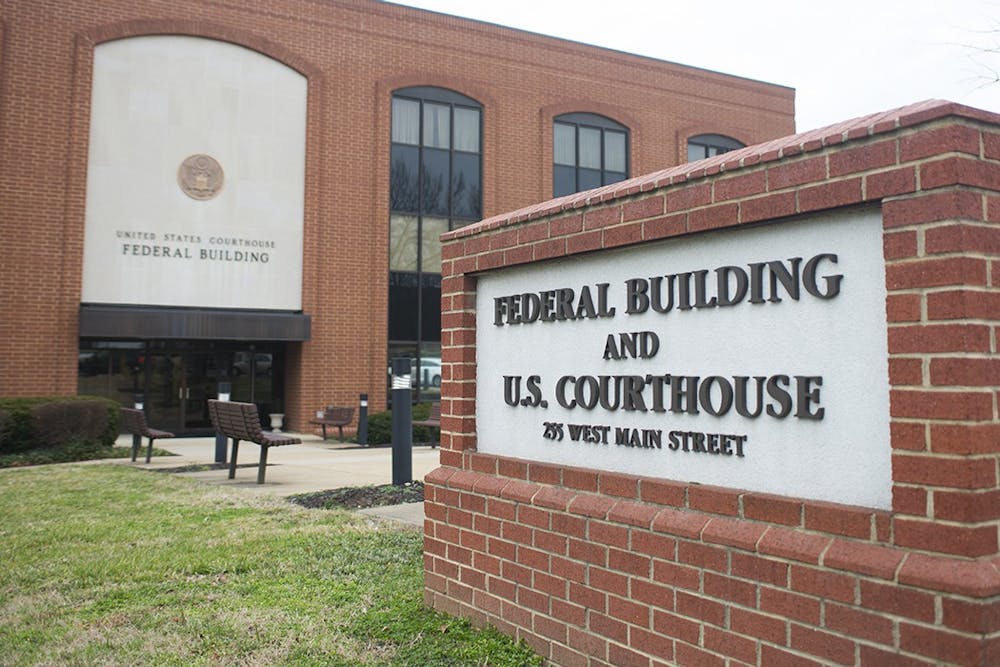A civil trial filed against organizers of the “Unite the Right” rally is set to begin Monday, more than four years after the events of Aug. 11 and 12, 2017. Plaintiffs seek to prove there was a conspiracy to commit racial violence during the rally.
“The violence, suffering, and emotional distress that occurred in Charlottesville was a direct, intended, and foreseeable result of [the] Defendants’ unlawful conspiracy,” the complaint reads.
On Aug. 11, 2017, several hundred white supremacists gathered with torches around the statue of Thomas Jefferson on the North side of the Rotunda, chanting “White Lives Matter” and “Jews will not replace us.” A group of counter-protestors waited for the “alt-right” marchers at the Jefferson statue, chanting “Black Lives Matter” and circling around with their backs to the statue and linking arms. The two groups confronted each other and a fight broke out before the police separated them. Several people were injured during the altercation.
The next day, the “Unite the Right” rally drew hundreds of white supremacists and counter-protestors to Charlottesville. Organized in part by white supremacist and conspiracy theorist Jason Kessler, the rally brought hundreds of “alt-right” groups and individuals to Charlottesville’s Downtown Mall to protest City Council’s vote to remove the statue of Confederate General Robert E. Lee in what is now known as Market Street Park.
The Lee statue was constructed in 1924 and was commissioned by Paul Goodloe McIntire, the namesake of the University’s McIntire School of Commerce, McIntire Amphitheater and McIntire Department of Art. McIntire also bought Lee Park — which was renamed Market Street Park in 2018 — for the statue to reside.
Some of the protestors moved to McIntire Park after law enforcement officials declared the rally an unlawful assembly. At McIntire Park, attendees then listened to speeches from former Ku Klux Klan leader David Duke, Richard Spencer, founder of the white nationalist movement the “alt-right” and a graduate of the University, and Mike Enoch, host of the “alt-right” podcast “The Daily Shoah.”
During the day, white supremacist James Alex Fields Jr. drove a car at high speed through a crowd of counter-protesters, injuring 19 individuals and kiling Heather Heyer, a 32 year-old Charlottesville resident. A civil rights activist, Heyer was marching with counter-protestors when Fields struck her with the vehicle. Following Heyer’s death, the section of the street where she was struck was renamed Heather Heyer Way in her honor.
The Lee statue was finally removed in July 2021 following years of advocacy by local groups and activists, including third-year College student Zyahna Bryant who first authored the petition to remove the statue in 2016 as a high school freshman. Assoc. Religious Studies Prof. Jalane Schmidt also developed a tour to educate the public about the history of Charlottesville’s monuments and actively organized counter-protests in opposition to the “Unite the Right” rally.
There are nine plaintiffs in the case, including Marcus Martin and Marissa Blair, Charlottesville residents who attended the protest with Heyer, Blair’s co-worker at the time. When Fields drove his car through protestors, Martin pushed Blair out of the way and Martin’s leg and ankle were broken.
Another plaintiff is Elizabeth Sines, a law student at the University at the time of the rally. Sines was a counterprotester who said she has suffered severe emotional distress as a result of the event.
Other plaintiffs also include counterprotesters who were injured the night of Aug. 11, as well as a minister who was assaulted and a Jewish woman who faced antisemitic slurs while counter protesting. All nine plaintiffs suffered psychological trauma, physical injuries or both as a result of the rally.
The civil rights nonprofit leading the lawsuit is Integrity First for America. Executive Director of IFA Amy Spitalnick says the organization decided to research and build this lawsuit because at the time, the federal government did not do anything to respond to the violence.
“What had happened was horrific, it clearly couldn’t have been an accident, and there needed to be some sort of accountability,” Sitalnick said. “The Department of Justice — led then by Jeff Sessions — was unlikely, at best, to pursue that sort of accountability.”
At the time, former president Donald Trump responded to the violence in Charlottesville by saying that there were “very fine people on both sides.”
In addition to proving that white supremacist and white nationalist organizations planned the violence that took place, IFA hopes that a multi-million dollar verdict against the defendants would bankrupt and disrupt many white supremacist organizations nationwide.
Fields was found guilty in Dec. 2018 of the first-degree murder of Heyer, eight counts of malicious wounding and one hit-and-run count for injuring dozens of others with his vehicle. He was sentenced to life plus 419 years in prison, as well as $480,000 in fines. Fields has been held in Hazelton Federal Penitentiary since Sept. 2019.
While Fields’ sentencing was a result of a criminal lawsuit filed against him, the upcoming civil trial will involve disputes among private parties and is filed under the Ku Klux Klan Act of 1871, a Reconstruction-era piece of legislation that allows victims of racially motivated violence to sue if they can prove that the violence was preceded by a conspiracy.
IFA filed the lawsuit four years ago, but the trial has been delayed repeatedly due to the pandemic and defendants not showing up for depositions.
The 24 defendants in the case include Fields, Spencer, Kessler and a number of groups, including two chapters of the Ku Klux Klan. Seven of the 24 defendants have already lost to the plaintiffs in default judgments, which are rulings by courts or judges granted when a defendant fails to cooperate with court orders.
Jury selection for the trial begins Monday, and opening arguments will start Wednesday. Due to the pandemic, only the judge, jury, courtroom officials, plaintiff, defendants and attorneys will be allowed in the courthouse. Journalists will watch from a separate room, while the public can listen to an audio recording







